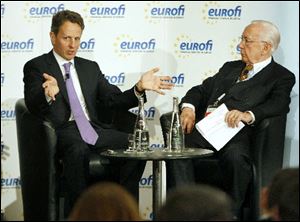
Geithner strikes optimistic tone on global recovery ahead of G20
2/18/2011
U.S. Treasury Secretary Timothy Geithner, left, and former France Central bank Governor Jacques de Larosiere on Friday ahead of a G20 Finance meeting in Paris.
But ahead of a meeting of Group of 20 finance chiefs, China rejected the notion that its currency practices were a subject for others to debate or an appropriate target to blame for economic imbalances.
Geithner told a high-level seminar organized by the Eurofi think tank that economic indicators point to a strengthening global economy but said that policymakers must keep track of forces that could still potentially destabilize growth
“Of course, we have to look at measures of imbalances. There’s no alternative,” he said. “We need to look at measures of external imbalances like the current account as well as ... internal imbalances.”
The G20 gathering is expected to discuss what indicators are most appropriate for gauging the extent of imbalances like excess reserves or big trade surpluses. But widespread differences among members limit the chance of a broad agreement.
Shortly before Geithner spoke, China — whose huge trade and current account surplus with the United States is one of the reasons for the debate — rejected plans to use real exchange rates and currency reserves to measure economic imbalances.
Chinese Finance Minister Xie Xuren also said the G20 should use trade figures rather than current account balances to assess economic distortions.
Geithner didn’t list specific indicators he thought should be used for measuring imbalances — a first step for policymakers to come up later with “indicative guidelines” for corrective action.
He sounded bullish about the world economy’s prospects.
“There’s justifiable growing confidence out there,” he said.
“You’re seeing the challenges and risks shift, the emerging world growing very rapidly, and facing the challenge of how to use monetary policy to help contain inflation pressures.”
He said both the United States and Europe need to impose further restraints on leverage risk-taking by financial institutions and tighten supervision of derivatives markets.
The G20 meeting, under France’s leadership, is to boost a process for identifying the type of imbalances that were blamed for contributing to and aggravating the financial crisis and recession that struck the global economy in 2008 and 2009.
Geithner implied it may be a lengthy process.
“We’re trying to build an initial consensus on the international monetary system that would build a system less prone to imbalance and the huge imbalances in capital flows,” he told the group.
For the Obama administration, a key piece of that is to keep urging China to let its yuan currency, also called the renminbi, rise more rapidly. The U.S. view is that doing so would mean China would rely more on domestic demand for its growth and would be itself be less vulnerable to inflation.
“We’re trying to build a system that has a better balance of exchange rate policy in large emerging countries,” Geithner said, without naming China.
“We’ve got to make sure we keep our eyes on the basic imperative, to heal the damage caused by this crisis and get stronger growth globally, and particularly in the major economies,” he added.